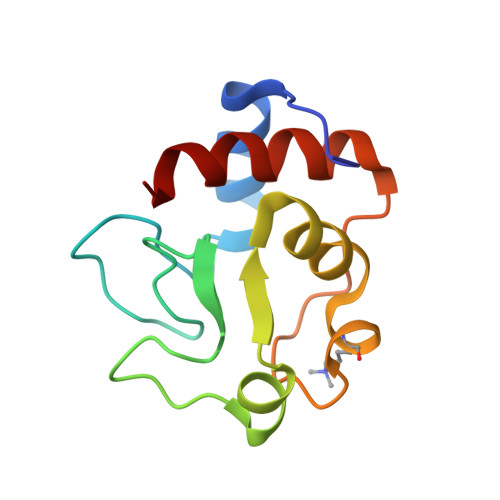The role of a conserved internal water molecule and its associated hydrogen bond network in cytochrome c.
Berghuis, A.M., Guillemette, J.G., McLendon, G., Sherman, F., Smith, M., Brayer, G.D.(1994) J Mol Biol 236: 786-799
- PubMed: 8114094
- DOI: https://doi.org/10.1006/jmbi.1994.1189
- Primary Citation of Related Structures:
1CRG, 1CRH, 1CRI, 1CRJ - PubMed Abstract:
High resolution three-dimensional structures for the N52I and N52I-Y67F yeast iso-1-cytochrome c variants have been completed in both oxidation states. The most prominent structural difference observed in both mutant proteins is the displacement of a conserved, internally bound water molecule (Wat166) from the protein matrix. In wild-type yeast iso-1-cytochrome c the position and orientation of this water molecule is found to be dependent on the oxidation state of the heme iron atom. Overall our results suggest the function of Wat166 and its associated hydrogen bond network is threefold. First, the presence of Wat166 provides a convenient mechanism to modify the hydrogen bond network involving several residues near the Met80 ligand in an oxidation state dependent manner. Second, Wat166 is necessary for the maintenance of the spatial relationships between nearby side-chains and the hydrogen bond interactions formed between these groups in this region of the protein. An essential part of this role is ensuring the proper conformation of the side-chain of Tyr67 so that it forms a hydrogen bond interaction with the heme ligand Met80. This hydrogen bond influences the electron withdrawing power of the Met80 ligand and is therefore a factor in controlling the midpoint reduction potential of cytochrome c. Elimination of this interaction in the N52I-Y67F mutant protein or elimination of Wat166 in the N52I protein with the subsequent disruption in the position and interactions of the Tyr67 side-chain, leads to a drop of approximately 56 mV in the observed midpoint reduction potential of the heme group. Third, Wat166 also appears to mediate increases in the mobility of three nearby segments of polypeptide chain when cytochrome c is in the oxidized state. Previous studies have proposed these changes may be related to oxidation state dependent interactions between cytochrome c and its redox partners. Coincident with the absence of Wat166, such mobility changes are not observed in the N52I and N52I-Y67F mutant proteins. It is possible that much of the increased protein stability observed for both mutant proteins may be due to this factor. Finally, our results show that neither heme iron charge nor heme plane distortion are responsible for oxidation state dependent conformational changes in the pyrrole A propionate region. Instead, the changes observed appear to be driven by the change in conformation that the side-chain of Asn52 experiences as the result of oxidation state dependent movement of Wat166.
Organizational Affiliation:
Department of Biochemistry, University of British Columbia, Vancouver, Canada.

















